新编实用英语综合教程二unit_4_hotel_service
新编实用英语综合教程二unithotelservice

Back
Unit | Four
Acting out the Tasks
Speak and Perform
2 Work in pairs and act out the tasks by following the above mini-talks.
Receptionist: I’m awfully sorry. We don’t have any room available now. Tom: No problem. I’ll try some other hotels nearby.
Receptionist: Goodbye!
5) May I pay by traveler’s check? Susan: Good morning. I would like to check out.
1 Task: You are leaving for New York next week. Make a reservation with a hotel there by telephone.
2 Task: You want to check into a hotel where you have already made a reservation. 3 Task: You come to a hotel and ask for a single room with a good view.
Back
Unit | Four
3) Would you please show me your passport? Catherine: I would like to stay in this hotel for a couple of days.
新编实用英语综合教程2_unit_4 (课堂PPT)

离开房间时请把钥匙留在房里。
12
10. instruction
(n.) a statement or guidance, telling people what they should do 指示,说明
Eg. Please maintain a close contact.
9
7. lounge
(n.) room in a hotel, club, etc. where people sit & relax 休息室,小客厅
Eg. In the lounge of the hotel, drinks are usually more expensive than in other places.
Eg. Follow the instructions on the packet(包装) carefully.
13
11. emergency
(n.) an unexpected & difficult or dangerous situation 紧急情况
Eg. The plane made an emergency landing.
1. (v.) get in touch, reach by telephone, etc. 联 系
Eg. As soon as we find out anyt.) the act of meeting, touching, or receiving information from someone. 联系
2
II. Words & Expressions
新编实用英语综合教程2(第二版)练习答案 (unit4-unit6)
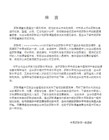
Payment: in cash
Tel. Number: 0086-431-568-9672
Fax: 0086-431-568-9675
Email address: dong@
6. firefighters
7. burns
8. hospital
9. guests
10. cause
A篇 迈阿密大学克莱姆宾馆住宿指南
欢迎您入住克莱姆宾馆,我们荣幸地向迈阿密大学尊贵的客人提供优美的住宿条件。在我们向您提供服务期间,我们提醒您注意以下事项:
4. How are you going to pay , in cash or by credit card ?
5. Here is the change , $ 23
P58- 3
1. fire
2. 3:10
3. reporters
4. on fire
5. at the windows
*在衣架上面的架子上有杯子、备用毛巾和枕头。
*结账时间为上午10:00,离开时请把钥匙留在房间内。
使用电话须知:
*校内电话:只需拨打后五位号码,无需拨打前面的两位号码52
*当地电话:先拨打88,再拨打7位校外电话号码。
*需要由AT&T公司转接的电话(包括对方付费电话和磁卡电话等):——先拨80,再拨区号(拨打长途电话时的区号),然后拨电话号码。听到可拨号长音后你也可以输入电话号码或等待接线员转接。拨打800进入你的电话卡服务系统。先拨81,再拨卡上的800卡号。
8. inconvenience
9. comfortably
10. available
实用英语综合教程2Unit4
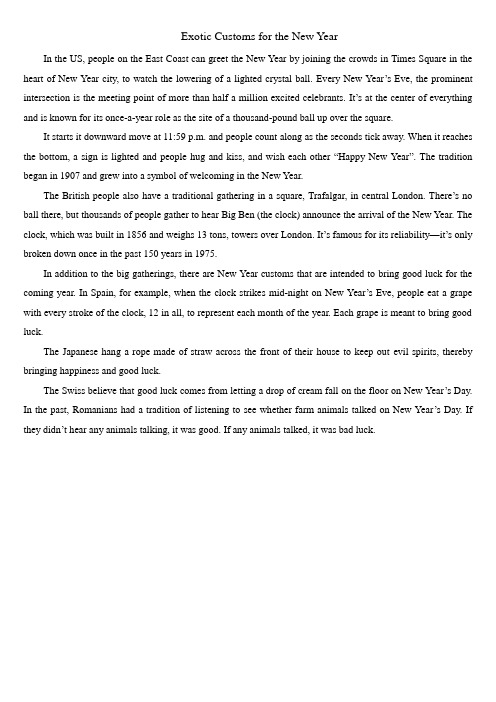
Exotic Customs for the New YearIn the US, people on the East Coast can greet the New Year by joining the crowds in Times Square in the heart of New Year city, to watch the lowering of a lighted crystal ball. Every New Year’s Eve, the prominent intersection is the meeting point of more than half a million excited celebrants. It’s at the center of everything and is known for its once-a-year role as the site of a thousand-pound ball up over the square.It starts it downward move at 11:59 p.m. and people count along as the seconds tick away. When it reaches the bottom, a sign is lighted and people hug and kiss, and wish each other “Happy New Year”. The tradition began in 1907 and grew into a symbol of welcoming in the New Year.The British people also have a traditional gathering in a square, Trafalgar, in central London. There’s no ball there, but thousands of people gather to hear Big Ben (the clock) announce the arrival of the New Year. The clock, which was built in 1856 and weighs 13 tons, towers over London. It’s famous for its reliability—it’s only broken down once in the past 150 years in 1975.In addition to the big gatherings, there are New Year customs that are intended to bring good luck for the coming year. In Spain, for example, when the clock strikes mid-night on New Year’s Eve, people eat a grape with every stroke of the clock, 12 in all, to represent each month of the year. Each grape is meant to bring good luck.The Japanese hang a rope made of straw across the front of their house to keep out evil spirits, thereby bringing happiness and good luck.The Swiss believe that good luck comes from letting a drop of cream fall on the floor on New Year’s Day. In the past, Romanians had a tradition of listening to see whether farm animals talked on New Year’s Day. If they didn’t hear any animals talking, it was good. If any animals talked, it was bad luck.。
新编实用英语第二册unit4 课文参考译文 .

新编实用英语第二册unit4 课文参考译文A篇迈阿密大学克莱姆宾馆住宿指南欢迎您入住克莱姆宾馆,我们荣幸地向迈阿密大学尊贵的客人提供优美的住宿条件。
在我们向您提供服务期间,我们提醒您注意以下事项:* 客房部经理住在大厅入口旁的129室,您可以拨打9-5226与他联系。
平时每天下午5:00以后,以及周末期间,您若有问题和要求,请与客房部经理联系。
*在旅馆底层有冰箱,灌装饮料机,休息区和小厨房,那里提供咖啡,茶和欧洲大陆淡清早餐。
* 休息区开放时间:每天造成6:00至晚上11:00点。
这里为无烟区。
*娱乐中心开放时间:周日至周四上午9:00至晚上10:00;周五,周六上午9:00至晚上11;00。
无救生员值班。
孩子在池中戏水时需家长全程陪同在场。
桑拿浴房禁止儿童入内。
*在衣架上面的架子上有杯子、备用毛巾和枕头。
*结账时间为上午10:00,离开时请把钥匙留在房间内。
使用电话须知:*校内电话:只需拨打后五位号码,无需拨打前面的两位号码52*当地电话:先拨打88,再拨打7位校外电话号码。
*需要由A T&T公司转接的电话(包括对方付费电话和磁卡电话等):——先拨80,再拨区号(拨打长途电话时的区号),然后拨电话号码。
听到可拨号长音后你也可以输入电话号码或等待接线员转接。
拨打800进入你的电话卡服务系统。
先拨81,再拨卡上的800卡号。
*拨打800号免费电话:拨81-800电话号码*拨打国际长途:拨8-011-国家代码-诚实代码-电话号码-*呼救电话:拨打公共安全电话:911(匪警、火警、急救)由于周末我们不能提供清扫房间服务,为了保证度周末的客人起居舒适,我们为您提供了备用毛巾。
对于没有清洁服务给您带来的不便我们深表歉意。
如果您需要,我们还可以向您提供熨斗和熨衣板。
如有事,请与我们联系,办公时间拨打9-1279,晚间或周末拨打9-5226。
如果您有任何其它要求,请与客房部经理联系(分机号:9-5226)我们希望您在此居住期间感到舒适和愉快,多谢您的光临。
新编实用英语综合教程2 -Unit 4 Hotel Service教案
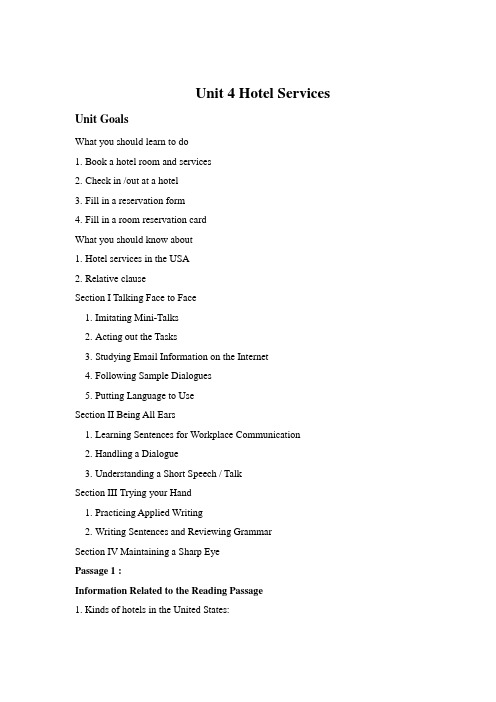
Unit 4 Hotel Services Unit GoalsWhat you should learn to do1.Book a hotel room and services2.Check in /out at a hotel3.Fill in a reservation form4.Fill in a room reservation cardWhat you should know about1.Hotel services in the USA2.Relative clauseSection I Talking Face to Face1.Imitating Mini-Talks2.Acting out the Tasks3.Studying Email Information on the Internet4.Following Sample Dialogues5.Putting Language to UseSection II Being All Ears1.Learning Sentences for Workplace Communication2.Handling a Dialogue3.Understanding a Short Speech / TalkSection III Trying your Hand1.Practicing Applied Writing2.Writing Sentences and Reviewing GrammarSection IV Maintaining a Sharp EyePassage 1 :Information Related to the Reading Passage1. Kinds of hotels in the United States:Places to stay for a short time may be called hotels, hostels, motels or motor hotels, inns, lodges or resorts. Hostels, also referred to as youth hostels, are often for students working away from home. Motels have plenty of parking space and are usually near a freeway or highway. Inns are usually like motels. Lodges and resorts, or resorts hotels, are in the mountains, on the coast, or near lakes.2. Kinds of beds:Beds go by many different names. Starting with the smallest, there are single, twin, double, queen and king size ones. “Long boys”are for exceptionally tall people. At some hotels, queen beds are the smallest size used, so a double room has two of them. Some hotels even offer their guests waterbeds. A rollaway can be moved into a room to sleep an extraperson. Hide-a-beds are sofas that fold out to make beds.Text Welcome to Climer LodgeMiami UniversityOxford, Ohio 45056Welcome to Climer Lodge. We are fortunate to have this beautiful facility to accommodate very special guests from Miami University. In our efforts to serve you, we ask that you note the following:●The resident manager lives in Room 129, near the lobby entrance, and may be reached by dialing 9-5226. Please contact the manager if you have any questions or needs after 5:00 P.M. on weekdays and throughout weekend stays.●On the lower level of Climer you will find an ice machine, a canned beverage machine, a lounge area and kitchenette where coffee and tea and a light continental breakfast are provided.●Lounge Hours:6:00 A.M. to 11:00 P.M. daily. It is a non-smoking atmosphere.●Recreation Center Hours:9:00 A.M. to 10:00 P.M., Sunday through Thursday. 9:00 A.M. to 11:00 P.M. onFriday and Saturday. No lifeguard is on duty in the swimming pool. Parents are required to be present at all times when children are in the pool. No children are allowed in the sauna.●Check-out time is 10:00 A.M. Upon departure, please leave the key in your room.Phone Instructions:●On-campus calls: Dial only the last 5 numbers. No need to dial the 52 prefix.●Local telephone calls: Dial 88, then the 7-digit off-campus number.●AT&T operator-assisted calls (collect, calling card, etc.) —dial 80, the area code(for all long distance calls), then the telephone number.To place an international call: Dial 8+011+Country Code+City Code+Number ●EMERGENCY PHONE NUMBER: PUBLIC SAFETY —911 (Police, Fire, Medical)Language Points1 Explanation of Difficult Sentences1. (Para. 1) We are fortunate to have this beautiful facility to accommodate very special guests of Miami University.Analysis: In this sentence the infinitive phrase to have this beautiful facility ...is used as an adverbial of reason, modifying are fortunate.Translation: 我们很荣幸为迈阿密大学尊贵的客人们提供优美的住宿条件。
新编实用英语综合教程第二册unit4课后练习答案
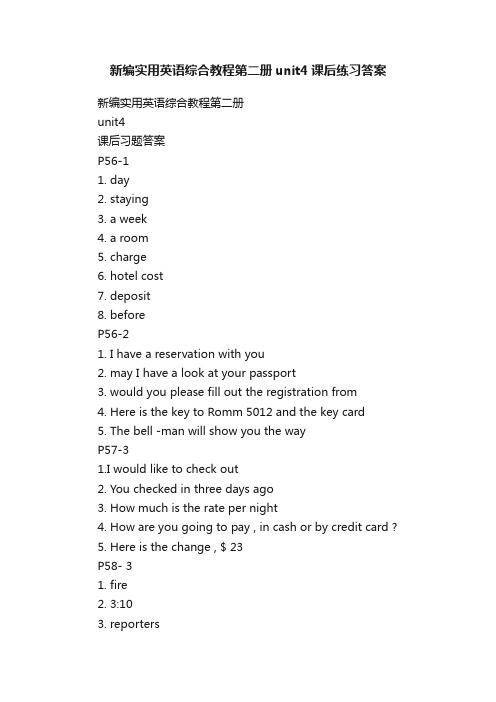
新编实用英语综合教程第二册unit4课后练习答案新编实用英语综合教程第二册unit4课后习题答案P56-11. day2. staying3. a week4. a room5. charge6. hotel cost7. deposit8. beforeP56-21. I have a reservation with you2. may I have a look at your passport3. would you please fill out the registration from4. Here is the key to Romm 5012 and the key card5. The bell -man will show you the wayP57-31.I would like to check out2. You checked in three days ago3. How much is the rate per night4. How are you going to pay , in cash or by credit card ?5. Here is the change , $ 23P58- 31. fire2. 3:103. reporters4. on fire5. at the windows6. firefighters7. burns8. hospital9. guests10. causeA篇迈阿密大学克莱姆宾馆住宿指南欢迎您入住克莱姆宾馆,我们荣幸地向迈阿密大学尊贵的客人提供优美的住宿条件。
在我们向您提供服务期间,我们提醒您注意以下事项:* 客房部经理住在大厅入口旁的129室,您可以拨打9-5226与他联系。
平时每天下午5:00以后,以及周末期间,您若有问题和要求,请与客房部经理联系。
*在旅馆底层有冰箱,灌装饮料机,休息区和小厨房,那里提供咖啡,茶和欧洲大陆淡清早餐。
新编实用英语综合教程第二学期教案

2014-2015学年第二学期大学英语教案授课教师:崔俊学授课班级:2014级数学教育1、2班教研室:大学英语教研室Unit 1 Invitation EtiquetteTopic: Good MannersObjectives: S tudents should be able to:1. Talk about good manners;2. Understand the content, the organization of the text and the writing devices of the passage;3. Know and make use of the language points, especially expressions, learned from the text;4. Grasp some key words, expressions and sentence patterns for expressing ideas on related topics;5. Learn how to write a note of thanks;6. get some tips about English modal verbs.Important/Difficult Point(s):1.Grammar2.Raise the awareness of good manners.Materials and Resources:1.Multimedia2.PPTs3.Colorful chalks4.ChalkboardProcedure:Period 1Step 1: Warm upWarm-up Discussion:Ask students to form groups of four and discuss on the topic: “D o you think good manners are important in our life? Why?”Group leaders will be asked to present group opinions.Step 2: Reading StrategyAsk students to read through the whole passage without referring to the word list. Tryto scan through to find out the main idea. And skim the passage to find out the corresponding part of the passage to the comprehension exercise after the passage. Period 2Step 1: Word study1. Read new words2. Memories them all.Step 2: Word analysisPlan for Follow Up Lesson:1.Our next class will begin with the passage. The students will be reminded atthe end of this class to prepare the readings for next class.2.The next class will be structured through passage analysis and languagestudy.Period 3Step 1: Warm-up1.Students are asked to take out a piece of paper and recite new words. A number ofstudents will be called to read some words out for the teacher to check pronunciation.2.Students watch a short video about the mannersStep 2: Passage Aprehensive study of passage Aa.main ideab.structure analysisnguage studyPeriod 4Step 1:Finish all the after-reading exerciseStep 2: Active Words1.Teacher explains the usage and examples2.Students make sentences and try to memories the usagesStep 3: HomeworkFinish Vocabulary Check after the Active Words.Plan for follow-up lesson1.Students should prepare for the study of Text B.2.Students should prepare for group discussion and writing.Period 5Step 1: Warm-upGroup Study: Students are asked to form groups of four and discuss on the topic “What is the Golden Rule in dealing with others?” Group leaders present the result. Step 2: Fast-reading of Passage BStudents are required to take advantage of fast reading strategies to do comprehension work.Step 3: Word StudyPeriod 6:Step 1: Passage Analysis1. Comprehensive study of passage B1)main idea2) structure analysis2. Language studyStep 2: (Homework)Ask students to finish after-reading activities.Period 7Step 1: Warm-up1. Students are asked to take out a piece of paper and recite new words. A number of students will be called to read some words out for the teacher to check pronunciation.2. Students do listening practice.Step 2: Grammar studyStep 3: Finish exercise of Modal VerbsPeriod 8:Step 1: ExerciseStudents are required to do comprehensive exercises in class within a certain timeframe. The teacher will check the answer.Step 2: Writing Practice --- How to write a note of thanksThe teacher will explain what a note of thanks is and how to write it. Students will be shown with the example a note of thanks.Students are required to write a note of thanks in a group.Plan for follow-up class1.Our next class will begin with Unit2. The students will be reminded at the end ofthis class to prepare the readings for next week.2.The next class will be structured through small group work and whole classdiscussions.Unit 2 E-mailTopic: Living EnvironmentObjectives: S tudents should be able to:1. Talk about Living Environment;2. Understand the content, the organization of the text and the writing devices of the passage;3. Know and make use of the language points, especially expressions, learned from the text;4. Grasp some key words, expressions and sentence patterns for expressing ideas on related topics;5. Learn how to write a note of apology;6. Get some tips about adverbial clauses of time in English.Important/Difficult Point(s):1.Grammar2.Raise the awareness of environmental protection.Materials and Resources:1.Multimedia2.PPTs3.Colorful chalks4.ChalkboardProcedure:Period 1Step 1: Warm upWarm-up Discussion:Ask students to form groups of four and discuss on the topic: “What suggestions do you have for environmental protection?” Group leaders will be asked to present group opinions.Step 2: Reading StrategyAsk students to read through the whole passage without referring to the word list. Tryto scan through to find out the main idea. And skim the passage to find out the corresponding part of the passage to the comprehension exercise after the passage. Period 2Step 1: Word study1. Read new words2. Memories them all.Step 2: Word analysisPlan for Follow Up Lesson:1.Our next class will begin with the passage. The students will be reminded at theend of this class to prepare the readings for next class.2.The next class will be structured through passage analysis and language study. Period 3Step 1: Warm-up1.Students are asked to take out a piece of paper and recite new words. A number ofstudents will be called to read some words out for the teacher to check pronunciation.2.Students watch a short video about the environmental protection.Step 2: Passage A1. Comprehensive study of passage Aa.main ideab.structure analysis2. Language studyPeriod 4Step 1:Finish all the after-reading exerciseStep 2: Active Words1.Teacher explains the usage and examples2.Students make sentences and try to memories the usagesStep 3: HomeworkFinish Vocabulary Check after the Active Words.Plan for follow-up lesson1.Students should prepare for the study of Text B.2.Students should prepare for group discussion and writing.Period 5Step 1: Warm-upGroup Study: Students are asked to form groups of four and discuss on the topic “What does noise mean to ordinary people like you?” Group leaders present the result.Step 2: Fast-reading of Passage BStudents are required to take advantage of fast reading strategies to do comprehension work.Step 3: Word StudyPeriod 6:Step 1: Passage Analysis1. Comprehensive study of passage Ba)main idea2) structure analysis2. Language studyStep 2: (Homework)Ask students to finish after-reading activities.Period 7Step 1: Warm-up1. Students are asked to take out a piece of paper and recite new words. A number of students will be called to read some words out for the teacher to check pronunciation.2. Students do listening practice.Step 2: Grammar studyStep 3: Finish exercise of A dverbial Clauses of time.Period 8:Step 1: ExerciseStudents are required to do comprehensive exercises in class within a certain timeframe. The teacher will check the answer.Step 2: Writing Practice --- How to write a note of apologyThe teacher will explain what a note of thanks is and how to write it. Students will be shown with the example a note of apology.Students are required to write a note of apology in a group.Plan for follow-up class1.Our next class will begin with Unit 3. The students will be reminded at the end ofthis class to prepare the readings for next week.2. The next class will be structured through small group work and whole class discussions.Unit 3 Communication by phoneTopic: Fast foodObjectives: S tudents should be able to:1. Talk about fast food2. Understand the content, the organization of the text and the writing devices of the passage;3. Know and make use of the language points, especially expressions, learned from the text;4. Grasp some key words, expressions and sentence patterns for expressing ideas on related topics;5. Learn how to write a note of congratulations6. get some tips about the adverbial clause of purpose in EnglishImportant/Difficult Point(s):nguage points2.GrammarMaterials and Resources:1.PPTs2.Colorful chalks3.ChalkboardProcedure:Period 1Step 1: Warm upWarm-up Discussion:Ask students to form groups of four and discuss on the topic: “Do you like the food at McDonald’s or KFC? What attracts you most there?” Group leaders will be asked to present group opinions.Step 2: Reading StrategyAsk students to read through the whole passage without referring to the word list. Try to scan through to find out the main idea. And skim the passage to find out thecorresponding part of the passage to the comprehension exercise after the passage. Period 2Step 1: Word study1. Read new words2. Memories them all.Step 2: Word analysisPlan for Follow Up Lesson:1.Our next class will begin with the passage. The students will be reminded atthe end of this class to prepare the readings for next class.2. The next class will be structured through passage analysis and language study.Period 3Step 1: Warm-up1.Students are asked to take out a piece of paper and recite new words. A number ofstudents will be called to read some words out for the teacher to check pronunciation.2.Students watch a short video about the fast food.Step 2: Passage Aprehensive study of passage Aa.main ideab.structure analysisnguage studyPeriod 4Step 1:Finish all the after-reading exerciseStep 2: Active Words1.Teacher explains the usage and examples2.Students make sentences and try to memories the usagesStep 3: HomeworkFinish Vocabulary Check after the Active Words.Plan for follow-up lesson1.Students should prepare for the study of Text B.2.Students should prepare for group discussion and writing.Period 5Step 1: Warm-upGroup Study: Students are asked to form groups of four and discuss on the topic “What is your healthy diet?” Group leaders present the result.Step 2: Fast-reading of Passage BStudents are required to take advantage of fast reading strategies to do comprehension work.Step 3: Word StudyPeriod 6:Step 1: Passage Analysis1. Comprehensive study of passage Ba)main idea2) structure analysis2. Language studyStep 2: (Homework)Ask students to finish after-reading activities.Period 7Step 1: Warm-up1. Students are asked to take out a piece of paper and recite new words. A number of students will be called to read some words out for the teacher to check pronunciation.2. Students do listening practice.Step 2: Grammar studyStep 3: Finish exercise of Adverbial ClausePeriod 8:Step 1: ExerciseStudents are required to do comprehensive exercises in class within a certain timeframe. The teacher will check the answer.Step 2: Writing Practice --- How to write a note of congratulationsThe teacher will explain what a note of congratulations is and how to write it. Students will be shown with the example a note of congratulations.Students are required to write a note of thanks in a group.Plan for follow-up class1.Our next class will begin with Unit 4. The students will be reminded at the end ofthis class to prepare the readings for next week.2.The next class will be structured through small group work and whole classdiscussions.Unit 4 Hotel ServicesTopic: Daily shoppingObjectives: S tudents should be able to:1. Talk about shopping;2. Understand the content, the organization of the text and the writing devices of the passage;3. Know and make use of the language points, especially expressions, learned from the text;4. Grasp some key words, expressions and sentence patterns for expressing ideas on related topics;5. Learn how to write a note of announcement6. get some tips about the gerund in English grammarImportant/Difficult Point(s):nguage points2.GrammarMaterials and Resources:1.PPTs2.Colorful chalks3.ChalkboardProcedure:Period 1Step 1: Warm upWarm-up Discussion:Ask students to form groups of four and discuss on the topic: “Do you like shopping? Why or why not?” Group leaders will be asked to present group opinions.Step 2: Reading StrategyAsk students to read through the whole passage without referring to the word list. Try to scan through to find out the main idea. And skim the passage to find out the corresponding part of the passage to the comprehension exercise after the passage.Step 1: Word study1. Read new words2. Memories them all.Step 2: Word analysisPlan for Follow Up Lesson:1.Our next class will begin with the passage. The students will be reminded at theend of this class to prepare the readings for next class.2.The next class will be structured through passage analysis and language study. Period 3Step 1: Warm-up1.Students are asked to take out a piece of paper and recite new words. A number ofstudents will be called to read some words out for the teacher to check pronunciation.2.Students watch a short video about the shopping.Step 2: Passage Aprehensive study of passage Aa)main ideab)structure analysisnguage studyPeriod 4Step 1:Finish all the after-reading exerciseStep 2: Active Words1.Teacher explains the usage and examples2.Students make sentences and try to memories the usagesStep 3: HomeworkFinish Vocabulary Check after the Active Words.Plan for follow-up lesson1.Students should prepare for the study of Text B.2.Students should prepare for group discussion and writing.Step 1: Warm-upGroup Study: Students are asked to form groups of four and discuss on the topic “Why is it convenient to do shopping on line?” Group leaders present the result.Step 2: Fast-reading of Passage BStudents are required to take advantage of fast reading strategies to do comprehension work.Step 3: Word StudyPeriod 6:Step 1: Passage Analysis1. Comprehensive study of passage Ba)main idea2) structure analysis2. Language studyStep 2: (Homework)Ask students to finish after-reading activities.Period 7Step 1: Warm-up1. Students are asked to take out a piece of paper and recite new words. A number of students will be called to read some words out for the teacher to check pronunciation.2. Students do listening practice.Step 2: Grammar studyStep 3: Finish exercise of gerundPeriod 8:Step 1: ExerciseStudents are required to do comprehensive exercises in class within a certain timeframe. The teacher will check the answer.Step 2: Writing Practice --- How to write a note of AnnouncementThe teacher will explain what a note of announcement is and how to write it. Students will be shown with the example a note of announcement.Students are required to write a note of thanks in a group.Plan for follow-up class1.Our next class will begin with Unit 5. The students will be reminded at the end ofthis class to prepare the readings for next week.2.The next class will be structured through small group work and whole classdiscussions.Unit 5 Food BlogsTopic: Modern CommunicationObjectives:1. Students will be able to enlarge the vocabulary relating to modern communication.2. Students will be able to understand the content, the organization of the text and the writing devices of the passage.3. Students will be able to know and make use of the language points, especially expressions, learned from the text.4. Students will come to know the importance of managing incoming email.5. Students will be able to learn how to write a public notice.6. Students will be able to get some tips about the use of the infinitive in English. Important/Difficult Point(s):1.Grammar2. Experiences with cell phones and emails.Materials and Resources:1.Multimedia2.PPTs3.Colorful chalks4.ChalkboardProcedure:Period 1Step 1: Warm up1. Warm-up DiscussionQuestions: What is your favorite way of daily communication?Do you use the Internet?.2. Group DiscussionAsk students to form groups of four and discuss on the topic of Internet: How has the Internet influenced your life? Is the influence good or bad? Why?Appoint a team leader for each group.Group leaders will be asked to present group opinions.Step 2: Reading StrategyAsk students to read through the whole passage without referring to the word list. Try to scan through to find out the main idea. And skim the passage to find out the corresponding part of the passage to the comprehension exercise after the passage. Period 2Step 1: New word studyStep 2: (Homework)1. Read new words2. Memorize them all.Plan for Follow Up Lesson:1.Our next class will begin with the passage. The students will be reminded atthe end of this class to prepare the readings for next class.2.The next class will be structured through passage analysis and languagestudy.Period 3Step 1: Warm-up1.Students are asked to take out a piece of paper and recite new words. A number ofstudents will be called to read some words out for the teacher to check pronunciation.2.Students will go to spot dictation to practice their listening.Step 2: Text Aa.Guide the students to get the main idea.b.structure analysisPeriod 4Step 1:Language studyStep 2: Finish all the after-reading exercisePeriod 5Step 1: Warm-upGroup Study: Students are asked to form groups of four and talk about making telephone calls based on the following questions:What advantages does making phone cells have?Do you prefer making phone cells to sending short messages to your parents while you are in college? Why or why not?Group leaders present the result.Step 2: Active Words1.Teacher explains the usage and examples2.Students make sentences and try to memories the usagesStep 3: HomeworkFinish Vocabulary Check after the Active Words.Plan for follow-up lesson1.Students should prepare for the study of Text B.2.Students should prepare for group discussion and writing.Period 6:Step 1: Fast-reading of Text BStudents are required to take advantage of fast reading strategies to do comprehension work.Step 2: Brief Text Analysis1. The main idea of the text2. Questions relating to the major points of the textWhat problem is troubling email users and corporations around the world?What is the importance of managing emails?Who should be responsible for managing emails?Step 3: (Homework)Ask students to finish after-reading activities.Period 7Step 1: Warm-up1. Students are asked to take out a piece of paper and recite new words. A number of students will be called to read some words out for the teacher to check pronunciation.2. Students do listening practice.Step 2: Grammar Study: the infinitive in EnglishGuide students to learn the grammar points of this unit.Step 3: Exercises of the infinitive in EnglishPeriod 8:Step 1: ExercisesStudents are required to do comprehensive exercises in class within a certain timeframe. The teacher will check the answer.Step 2: Writing Practice --- How to write a public noticeThe teacher will explain what a public notice is and how to write it. Students will be shown with the samples.Students are required to write two notices according to the assignments in the textbook.Plan for follow-up class1.Our next class will begin with Unit 6. The students will be reminded at the end ofthis class to prepare the readings for next week.2. The next class will be structured through small group work and whole class discussions.Unit 6 Shopping and SightseeingTopic: Health CareObjectives:1.Students will know the background information related to the text.2.Students will be able to understand the content, the organization of the text andwriting devices of the text.3.Students will be able to grasp some key words, expressions and sentence patternsfor expressing ideas on related topics.4.Students will enlarge their vocabulary of diseases.5.Students will learn about the past participle in English.6.Students will learn how to write a name card.Important/Difficult Point(s):Key words and expressionsGrammarMaterials and Resources:1.PPTs2.Multimedia3.Colorful pens and markers4.Chalk, chalkboardProcedure:Period 1Step 1: Warm up:1. Ask students questions about healthDo you often get sick? What should we do if we want to stay healthy?2. Group DiscussionAsk students to form groups of four and discuss on the topic of health: What can we do in order to have a healthy, happy and long life?Appoint a team leader for each group.Group leaders will be asked to present group opinions.Step 2: Reading StrategyAsk students to read through the whole passage without referring to the word list. Try to scan through to find out the main idea. And skim the passage to find out the corresponding part of the passage to the comprehension exercise after the passage. Period 2Step 1: New word studyStep 2: (Homework)1. Read new words2. Memorize them all.Plan for Follow Up Lesson:1. Our next class will begin with the passage. The students will be reminded at the end of this class to prepare the readings for next class.2. The next class will be structured through passage analysis and language study. Period 3Step 1: Warm-up1. Students are asked to take out a piece of paper and recite new words. A number of students will be called to read some words out for the teacher to check pronunciation.2.Students will go to spot dictation to practice their listening.Step 2: Text A1. Guide the students to get the main idea.2. Structure analysisPeriod 4Step 1:Language studyStep 2: Finish all the after-reading exercisePeriod 5Step 1: Warm-upGroup Study: Students are asked to form groups of four and talk about experiences with doctors based on the following questions:1. What was your most unforgettable experience with doctors?2. What kind of doctor do you like best? Why?Group leaders present the result.Step 2: Active Words1. Teacher explains the usage and examples2. Students make sentences and try to memories the usagesStep 3: HomeworkFinish Vocabulary Check after the Active Words.Plan for follow-up lesson1. Students should prepare for the study of Text B.2. Students should prepare for group discussion and writing.Period 6:Step 1: Fast-reading of Text BStudents are required to take advantage of fast reading strategies to do comprehension work.Step 2: Brief Text Analysis1. The main idea of the text2. Questions relating to the major points of the textWhat are the secrets of a good night’s sleep?How many phases are there in the course of sleep?Step 3: (Homework)Ask students to finish after-reading activities.Period 7Step 1: Warm-up1. Students are asked to take out a piece of paper and recite new words. A number of students will be called to read some words out for the teacher to check pronunciation.2. Students do listening practice.Step 2: Grammar Study: the past participle in EnglishGuide students to learn the grammar points of this unit.Step 3: Finish exercises of the past participle in EnglishPeriod 8:Step 1: Comprehensive ExercisesStudents are required to do comprehensive exercises in class within a certain timeframe. The teacher will check the answer.Step 2: Writing Practice --- How to write a name cardThe teacher will explain what a name card is and how to write it. Students will be shown with the samples.Students are required to design a name card for themselves according to the assignment in the textbook.Plan for follow-up class1. Our next class will begin with Unit 7. The students will be reminded at the end of this class to prepare the readings for next week.2. The next class will be structured through small group work and whole class discussions.Unit 7 FarewellTopic: Generation gapObjectives: S tudents should be able to:1. Talk about generation gap2. Understand the content, the organization of the text and the writing devices of the passage;3. Know and make use of the language points, especially expressions, learned from the text;4. Grasp some key words, expressions and sentence patterns for expressing ideas on related topics;5. Learn how to write invitation cards or letters6. get some tips about the relative clause in EnglishImportant/Difficult Point(s):1.active verbs: start, concern, throw, care, count2.mean, major, concerned, dorm, save, sake, wear, exaggerate, collect, can, charge, priority, ruin, vacation,3.the relative clause in EnglishMaterials and Resources:1.PPTs2.Colorful chalks3.ChalkboardProcedure:Period 1Step 1: Warm upWarm-up Discussion:Ask students to form groups of four and discuss on the topics: 1) differences between my parents and 2) suggestions for bridging the generation gapDivide the students into groups of three or four. Appoint a team leader for each group. Invite some students to talk about the topics. Each speaker has two minutes for thepresentation.Step 2: Reading StrategyAsk students to read through the whole passage without referring to the word list. Try to scan through to find out the main idea. And skim the passage to find out the corresponding part of the passage to the comprehension exercise after the passage. Period 2Step 1: Word studyStep 2: Word analysisPlan for Follow Up Lesson:1.Our next class will begin with the passage. The students will be reminded at the end of this class to prepare the readings for next class.2.The next class will be structured through passage analysis and language study. Period 3Step 1: Warm-up1.Students are asked to take out a piece of paper and recite new words. A number of students will be called to read some words out for the teacher to check pronunciation.2.Students watch a short video about the generation gap.Step 2: Passage Aprehensive study of passage Ac.main idead.structure analysisnguage studyi.You don’t really feel the generation gap until a son or daughter comeshome form college fro Christmas.ii.What difference does it make?iii.Why don’t you do it for our sake?iv.But it’s very hard for us to realize you’re an adult when you throw all your clothes on the floor.Period 4Step 1:Finish all the after-reading exerciseStep 2: Active Words1.Teacher explains the usage and examples2.Students make sentences and try to memorize the usagesStep 3: HomeworkFinish Vocabulary Check after the Active Words.Plan for follow-up lesson1.Students should prepare for the study of Text B.2.Students should prepare for group discussion and writing.Period 5Step 1: Warm-upGroup Study: Students are asked to form groups of four and discuss on the topics “What do you do when you and your parents have different ideas about the same thing?” And “what suggestions do you have for bridging the generation gap?”Group leaders present the result.Step 2: Fast-reading of Passage BStudents are required to take advantage of fast reading strategies to do comprehension work.Step 3: Word StudyPeriod 6:Step 1: Passage Analysis1. Comprehensive study of passage B1)main idea2) structure analysis2. Language studyStep 2: (Homework)Ask students to finish after-reading activities.Period 7Step 1: Warm-up1. Students are asked to take out a piece of paper and recite new words. A number of。
新编实用英语2第四版Unit_four__hotel_service

Back
Unit | Four
Acting out the Tasks
Speak and Perform
2 Work in pairs and act out the tasks by following the above mini-talks.
Lynda: It’s Lynda Miller. The telephone number is 854-1742.
2) I have made a room reservation here. Jane: Good evening. I have made a room reservation here. Clerk: Let me check. Yes, there it is. A single room for one night. Jane: Yes, I’m leaving tomorrow. Clerk: Then you have to check out before 2 o’clock P.M.
Receptionist: Thank you, and here is the registration form for you to fill in.
4) I’m Awfully sorry. Tom: I’d like to book a single room for two nights.
Back
Unit | Four
3) Would you please show me your passport? Catherine: I would like to stay in this hotel for a couple of days.
新编实用英语第二册unit4课文参考答案
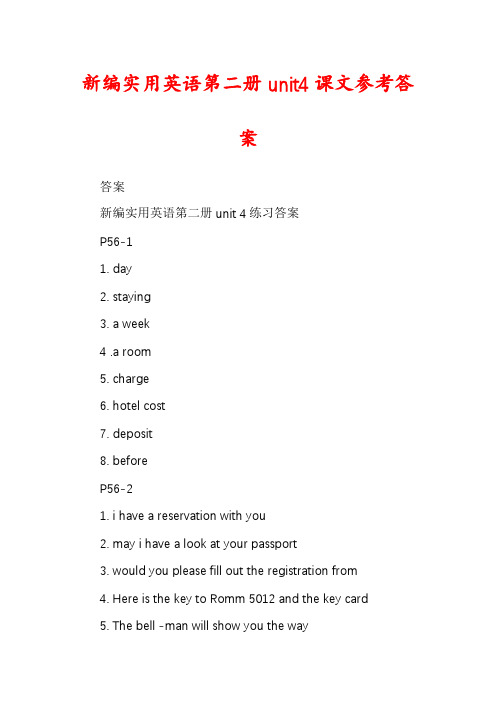
新编实用英语第二册unit4课文参考答案答案新编实用英语第二册unit 4练习答案P56-11. day2. staying3. a week4 .a room5. charge6. hotel cost7. deposit8. beforeP56-21. i have a reservation with you2. may i have a look at your passport3. would you please fill out the registration from4. Here is the key to Romm 5012 and the key card5. The bell -man will show you the way1. i would like to check out2. You checked in three days ago3. How much is the rate per night4. How are you going to pay , in cash or by credit card ? 答案5. Here is the change , $ 23P58- 31. fire2. 3:103. reporters4. on fire5. at the windows6. firefighters7. burns8. hospital9. guests10. causeP61-11F 2 T 3F 4F 5F 6F 7F 8T 9T 10T1. facilities2. canned / beverage3. breakfast4. services5. center6. evening7. board8.weekends fortable 10. enjoy P62-31. resident manager2. on the shelf / on the rack3. 10:00 in the morning答案5. 9116. on weekends7. the business hours8. comments or suggestionsP62-41. accommodation2. entrance3. residence4. services5. instruction6. additional7. apologize8. inconvenience9. comfortably10. availableP63-51. in case of emergency , please dial the alarm number 110.2. The off-campus students go to and from school every day by school bus3. The receptionist jotted down his name and ID number before arranging for his room .4. Upon departure , please switch off / turn off the air conditioner.5. If you have any additional needs or requests , please contact the resident mananger .答案They were fortunate to have got admission tickets to attend the famousscientist’s lecture.I was fortunate to see the excellent performance yesterday.2.Don’t hesitate to contact me if you need more information about the service.Please contact our sales manager if you are interested in ournew products.3.Upon departure, please check to make sure that nothing is left behind.Upon arrival, you should find a guide to help you go sightseeing.4.At the sight of the big dog, the little girl was frightened into crying.At the news of our team’s winning the game, we all jumped with joy.5.I apologize to you for my not contacting you in time.Mr. Howard apologized to his students for lack of patience and keeping on shouting at them.6. May I have your telephone number and e-mail address?May we have your advice or opinions on the management of the hotel?P65-71c 2d 3a 4b 5dP66-9他没有注意到计划的细节.无论你在世界什么地方,你都可以通过互联网与朋友聊天.他们与另一家人合租了一栋房子在那里度暑假.我们对那些能增值的项目特别感兴趣.狄更斯是世界著名的多产作家之一.酒店的创办人75年前对服务质量就做出了承诺.我期望他能满足你的特殊需要.我们要求中学生参加一次反毒品运动.P67-2 1.答案Reservation FormReservationsRamada InnSalt Lake City230 West 600 SouthSalt Lake City, Utah __(801) 364-5200Guest’Check in:Payment: Tel. Number: Fax:Email address:P69-41. who2. when3. which4. who /that5. who6. which7. whose8. where9. that 10. whomP69-51. which →that2.that →which3.who →whom4.which →where5.who → that6.which → that7.which → why8. whom → that9.critisms 后面加as10.that → whichP70-61.This is the place where/at which the traffic/car accident occurred.2.The contributions (that/which) he has made to the country will never be forgotten.3.I’d like to see the employee who has put forward the valuable suggestion.4.Could you tell me the reason why you refused the invitation to his birthday party?5.The pen, which was bought yesterday, will be sent to youas a gift.6.I can’t tell you the exact time when she will be in Guilin.7.He sold the house, which annoyed his wife.8.The ship that/which is being loaded is leaving/sailing tomorrow9.The ship that/which is being loaded is leaving/sailing tomorrow答案10.I’m sure I’ll enjoy everything that you cook.P70-7Since your ad says “have a good time or get your money,” I am requesting that you refundour money. From the moment we arrived, there were problems with the service. First, a very unfriendly desk clerk couldn’t found our reservation. After waiting almost half an hour, we wereled by another unfriendly clerk to our room. The room, which had a view of a parking lot instead of the bay, had not yet been cleaned, so we found dirty towels on the beds and cigarette ends on the floor. This was not the weekend we had been looking forward to. Service at your inn was not as I expected. So I stronglyinsist that you give me my refund。
实用英语综合教程2Unit4
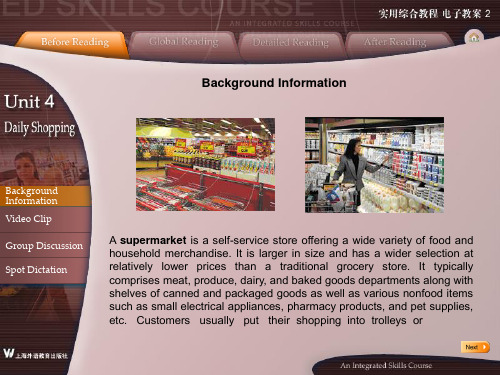
Spot Dictation
In a traditional ______ store, an assistant has to fetch products from grocery shelves inside a counter while the customers stand outside and point to
Background Information
Background Information Video Clip Group Discussion Spot Dictation
A supermarket is a self-service store offering a wide variety of food and household merchandise. It is larger in size and has a wider selection at relatively lower prices than a traditional grocery store. It typically comprises meat, produce, dairy, and baked goods departments along with shelves of canned and packaged goods as well as various nonfood items such as small electrical appliances, pharmacy products, and pet supplies, etc. Customers usually put their shopping into trolleys or
Background Information Video Clip Group Discussion Spot Dictation
新编实用英语综合教程二unit4hotelservice.1 推荐

4) I’m Awfully sorry. Tom: I’d like to book a single room for two nights.
What You Should Know About
1. Hotel services in the USA 2. Relative clauses
Talking Face to Face
Section Ⅰ
Section Ⅱ
Being All Ears
Section Ⅲ
Contents
Section Ⅴ
Appreciating Culture Tips
Section Ⅳ
Maintaining a Sharp Eye
Trying Your Hand
Section Ⅰ Talking Face to Face
Imitating Mini-talks
Speak and Recite
Acting out the Tasks
Back
Unit | Four
3) Would you please show me your passport? Catherine: I would like to stay in this hotel for a couple of days.
Receptionist: Welcome. Would you please show me your passport? Catherine: Here you are.
Receptionist: I’m awfully sorry. We don’t have any room available now. Tom: No problem. I’ll try some other hotels nearby.
新编实用英语综合教程2第三版Unit 4-Hotel Services

How to distinguish hotels from their names?
Hotel: a large building, big rooms, complete room services, facilities, star ratings
Motel (motor hotel): a parking area, located by the highway Hostel: backpackers, low-budget Inn: older and smaller type, providing lodging, food and drink B&B: family operated, breakfast served Resort: recreational facilities ( golf, tennis, ski) , scenery
5226. Please contact the manager if you have any questions or needs after 5:00 P.M. on weekdays and
联系
throughout weekend stays.
● On the lower level of Climer you will find an ice machine, a canned beverage machine, a lounge area
T: I______, please.
T: Is ____ OK?
F: _______your name, please?
F: That’ll be fine. Would you like a _____?
T: _______.
T: Yes, I’d like a ____ call for ____.
实用英语综合教程2Unit4

baskets and pay for them at the checkout. A larger supermarket combined with a department store is sometimes known as a hypermarket.
Background Information Video Clip Group Discussion Spot Dictation
Video Clip Questions:
1. Why are supermarkets today continually expanding, specializing and reorganizing?
Key
Background Information Video Clip Group Discussion Spot Dictation
Video Clip Source
Supermarket Bits -- Meridian
For video script, please scroll down the page.
Background Information Video Clip Group Discussion Spot Dictation
The next lesson is that women never follow a logical route when
shopping. Your wife has disappeared before you know it. After ten minutes of searching, when you finally find her in a far corner, she enquires: “Where have you been all this time, dear?” Supermarket managers are sent on courses to learn how to tempt the customers and persuade them to buy goods they do not really need, at prices they are not able to afford. As a newcomer, I am often taken in by their clever techniques, as I take many goods off the shelves. But I am often discouraged by my wife. “Put it back, dear”. “You’ve tried that before and didn’t take to it”. “No, it’s too expensive”.
- 1、下载文档前请自行甄别文档内容的完整性,平台不提供额外的编辑、内容补充、找答案等附加服务。
- 2、"仅部分预览"的文档,不可在线预览部分如存在完整性等问题,可反馈申请退款(可完整预览的文档不适用该条件!)。
- 3、如文档侵犯您的权益,请联系客服反馈,我们会尽快为您处理(人工客服工作时间:9:00-18:30)。
Acting out the Tasks
Speak and Perform
Studying Business Cards Study and Imitate
Following Sample Dialogues Imitate and Perform
Putting Language to Use
Speak and Complete Speak and Translate Speak and Communicate
Receptionist: All right, please show me your room card. Susan: Here you are. May I pay by traveler’s check?
Receptionist: Of course. Sign your name here, please.
Receptionist: I’m awfully sorry. We don’t have any room available now. Tom: No problem. I’ll try some other hotels nearby.
Receptionist: Goodbye!
5) May I pay by traveler’s check? Susan: Good morning. I would like to check out.
1 Task: You are leaving for New York next week. Make a reservation with a hotel there by telephone.
2 Task: You want to check into a hotel where you have already made a reservation. 3 Task: You come to a hotel and ask for a single room with a good view.
Unit | Four
Hotel Service
Unit | Four
Unit Goals:
What You Should Learn to Do
1. Book a hotel room and services 2. Check in / out at a hotel 3. Fill in a reservation form 4. Fill in a room reservation card
Lynda: It’s Lynda Miller. The telephone number is 854-1742.
2) I have made a room reservation here. Jane: Good evening. I have made a room reservation here. Clerk: Let me check. Yes, there it is. A single room for one night. Jane: Yes, I’m leaving tomorrow. Clerk: Then you have to check out before 2 o’clock P.M.
Window on Unit | Four
Acting out the Tasks
Speak and Perform
2 Work in pairs and act out the tasks by following the above mini-talks.
Receptionist: Thank you, and here is the registration form for you to fill in.
4) I’m Awfully sorry. Tom: I’d like to book a single room for two nights.
Section Ⅴ
Appreciating Culture Tips
Section Ⅳ
Maintaining a Sharp Eye
Trying Your Hand
Unit | Four
Section Ⅰ Talking Face to Face
Imitating Mini-talks
Speak and Recite
1) May I book a room for three nights? Receptionist: Good evening, Peace Hotel Reservation. May I help you?
Lynda: Yes, may I book two double rooms for three nights? Receptionist: Sure. Could you give me your name and telephone number, please?
Back
Unit | Four
3) Would you please show me your passport? Catherine: I would like to stay in this hotel for a couple of days.
Receptionist: Welcome. Would you please show me your passport? Catherine: Here you are.
Unit | Four
SECTION I Talking Face to Face
Imitating Mini-talks
Speak and Recite
1 Work in pairs. Look at the picture and recite the following mini-talks for making reservations or checking into a hotel.
What You Should Know About
1. Hotel services in the USA 2. Relative clauses
Unit | Four
Talking Face to Face
Section Ⅰ
Section Ⅱ
Being All Ears
Section Ⅲ
Contents
